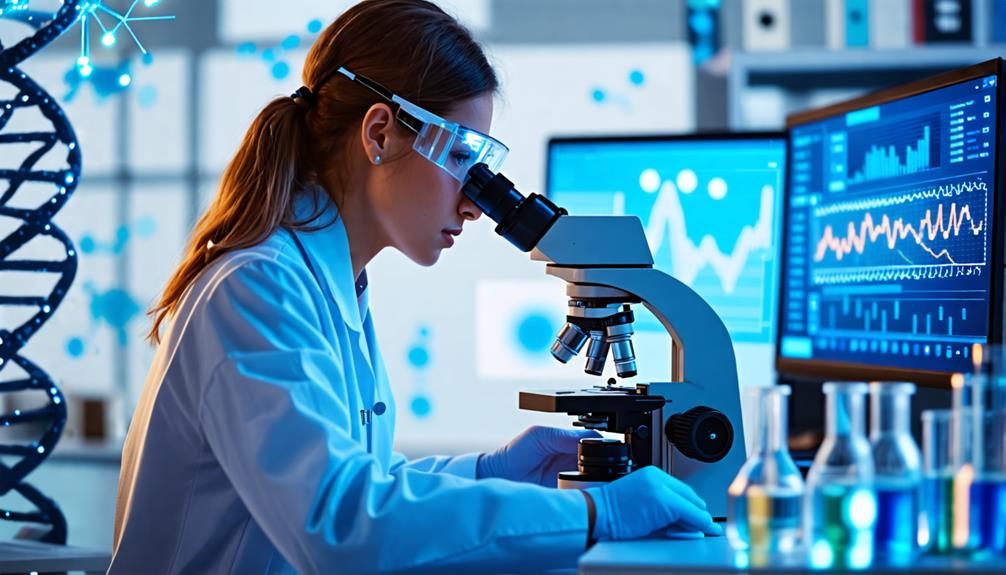
As a medical technologist, you analyze body fluids and tissues, helping physicians diagnose diseases. You'll operate sophisticated lab equipment, perform manual tests with great precision, and interpret results for effective patient care. Each day, you set up and calibrate equipment, ensuring everything runs smoothly. Working alongside healthcare professionals, you discuss patient results, contributing significantly to treatment decisions. You also maintain a clean and safe lab environment, staying current with medical guidelines and quality control standards. Specializing in areas like clinical chemistry, microbiology, or immunology could enhance your impact. Exploring further will reveal how diverse and vital your role can be in healthcare.
Roles and Responsibilities
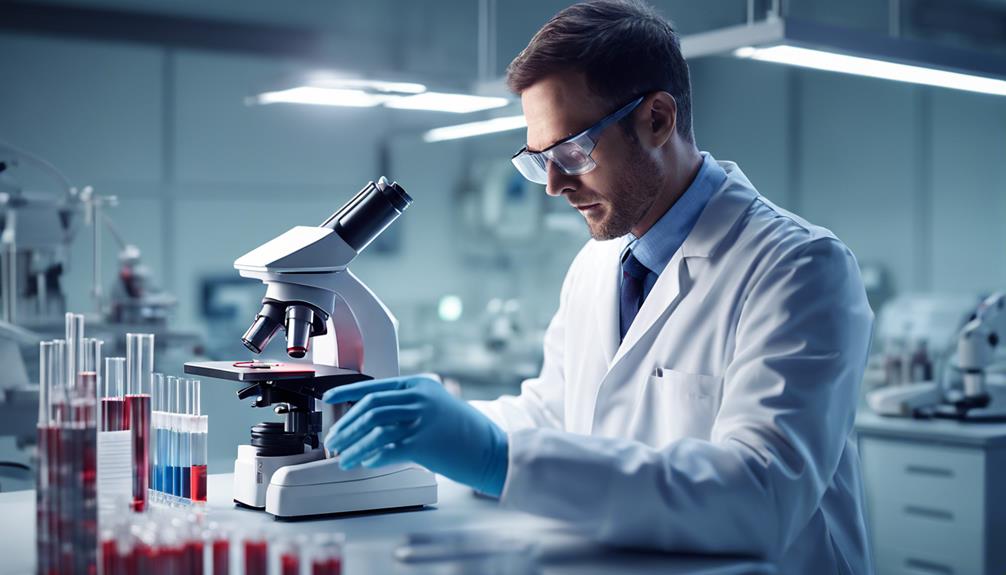
Medical technologists frequently analyze body fluids and tissues, ensuring accurate disease diagnosis and treatment. If you're in this field, you're deeply involved in testing samples that can include blood, urine, spinal fluid, and more. It's your responsibility to operate sophisticated equipment that extracts detailed information vital for patient care.
You'll also find yourself conducting manual tests with skills that need to be both meticulous and precise. Your role doesn't stop at testing; you're crucial in interpreting the results. This might mean you'll need to distinguish between benign and malignant cells, or identify microbial infections, and communicate these findings to physicians who rely heavily on your expertise to make informed treatment decisions.
Moreover, you're expected to maintain the laboratory equipment, ensuring everything functions correctly to avoid errors in test results. This includes regular calibration and sometimes troubleshooting of the devices you use daily.
Quality control is another significant aspect of your job. You have to regularly check the accuracy of the instruments and reagents used in testing to comply with stringent healthcare regulations. Each test you conduct doesn't just contribute to a diagnosis; it directly impacts a person's treatment plan and, ultimately, their health.
Educational Requirements
To become a medical technologist, you'll typically need to earn a bachelor's degree in medical technology or a related field. This program usually spans four years and includes courses in biology, chemistry, microbiology, math, and statistics, along with specific classes focusing on different laboratory techniques. You'll also encounter courses in hematology, clinical chemistry, and immunology, which are crucial for your future role.
Accreditation is key, so make sure the program you choose is accredited by the National Accrediting Agency for Clinical Laboratory Sciences (NAACLS) or a similar body. This accreditation ensures the quality of the educational program and can be essential for future certification and employment.
After your degree, you're not quite done. Certification is typically required by employers and can be obtained through organizations like the American Society for Clinical Pathology (ASCP). Preparing for certification involves passing a comprehensive exam that tests your knowledge and skills in laboratory services.
In some states, you'll also need to be licensed, which might involve additional exams and continuing education to maintain your license. It's important to check the specific requirements of the state where you intend to work, as these can vary significantly.
Daily Procedures and Tasks
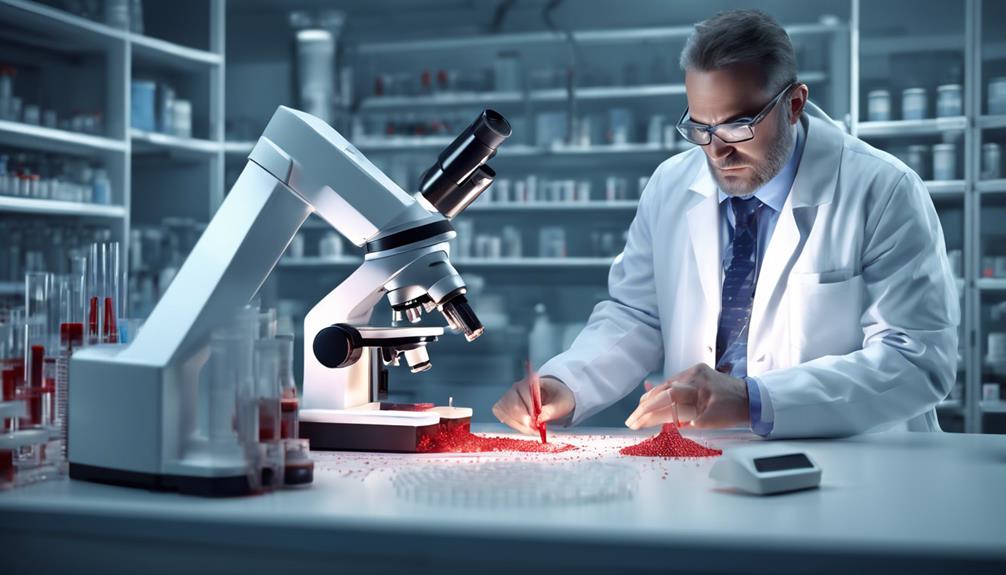
Once you've met the educational and certification requirements, you'll engage in a variety of daily tasks and procedures as a medical technologist. Your day usually starts with setting up and calibrating equipment, though we'll delve deeper into the specifics of the tools in another section.
You'll collect and analyze bodily fluids and tissues, preparing samples for examination and running routine tests. Accuracy is critical, so you'll carefully document each step and result, ensuring all data is precise for further analysis.
Throughout the day, you'll collaborate with healthcare professionals to discuss patient results and diagnostics. This requires not only technical skills but also strong communication abilities, as you must convey complex information in an understandable way.
You're also responsible for maintaining a clean and safe lab environment, adhering to strict hygiene and safety protocols to prevent contamination or infection.
Your role is crucial in detecting, diagnosing, and treating diseases, so staying updated with the latest medical guidelines and quality control standards is a must. You might also participate in research and development projects, contributing to advancements in medical technology and techniques.
Managing these responsibilities diligently ensures that patient care remains top-notch in your facility.
Tools and Technologies Used
As a medical technologist, you'll use a range of sophisticated equipment and technologies essential for analyzing patient samples. You'll frequently handle automated analyzers, which are critical for conducting a wide array of tests quickly and accurately. These machines often perform the bulk of the biochemical, hormonal, and genetic analyses.
Microscopes are another cornerstone in your toolkit. You'll depend on them to visually examine samples, identifying cellular details that aren't discernible to the naked eye. This can include everything from blood cells to bacteria, and it's your keen eye that can spot the subtle differences that indicate disease.
You'll also use centrifuges extensively. These devices spin samples at high speeds to separate substances of different densities, making it easier for you to analyze individual components of blood, urine, or other fluids.
Moreover, you'll work with spectrophotometers, which measure how much light is absorbed by the sample. This is crucial for determining the concentration of various substances, effectively helping diagnose conditions based on chemical signatures.
Each piece of equipment is a vital part of your arsenal, enabling you to provide essential data that helps guide patient care. These tools are your lifeline to uncovering vital health insights, ensuring you're at the forefront of diagnostic precision.
Specializations Within the Field
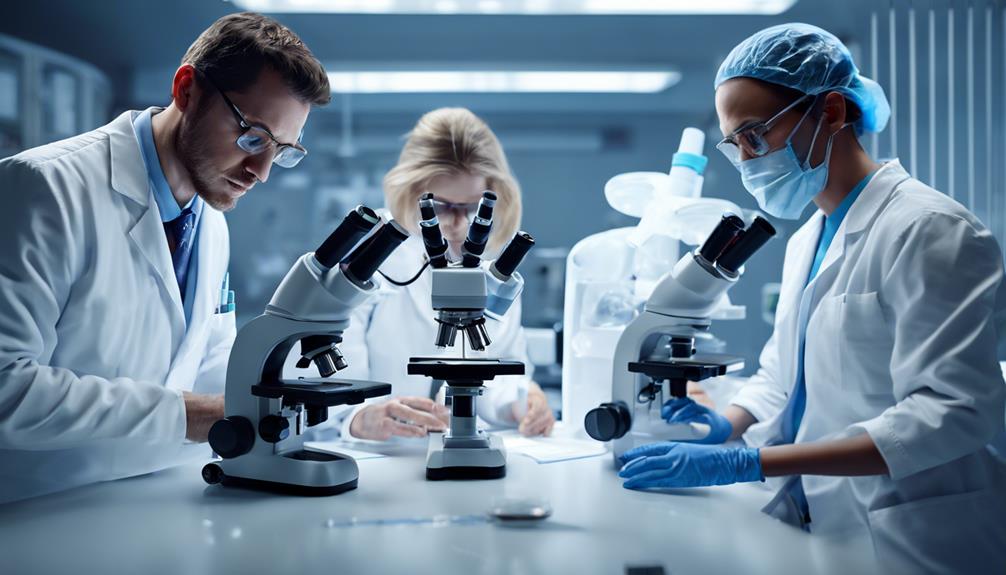
Within the field of medical technology, you can pursue several specialized areas, each focusing on different aspects of diagnostic medicine.
You might find yourself drawn to clinical chemistry, where you'll analyze bodily fluids to diagnose diseases. Or perhaps microbiology appeals to you, involving the study of bacteria, viruses, and other pathogens.
If you're intrigued by the genetic basis of diseases, molecular biology is a specialization where you'll work on DNA and RNA analysis, crucial for understanding genetic disorders and tailoring personalized treatments. Hematology is another fascinating choice, focusing on blood and its disorders. Here, you're looking at conditions like anemia, clotting abnormalities, and blood cancers.
You could also specialize in immunology, where you'll delve into the immune system and its response to various pathogens. This area is critical for developing vaccines and understanding autoimmune diseases.
Additionally, if technology and machinery captivate you, consider specializing in clinical instrumentation, where you manage and troubleshoot the complex devices used in diagnosis and treatment.
Each specialization not only sharpens your expertise in a particular area but also broadens your career opportunities in labs, hospitals, and research facilities. You'll be at the forefront of medical advancements, making a significant impact on patient care and treatment outcomes.
Challenges and Solutions
While specializing in a specific field of medical technology can enhance your skills, you'll also face unique challenges that require innovative solutions. As you delve deeper into your specialty, the complexity of the technologies and procedures you handle increases. You might find yourself struggling with the steep learning curves of cutting-edge equipment or grappling with rare, complicated cases that aren't covered in standard textbooks.
To overcome these, you'll need to stay ahead with continuous education. This isn't just about attending workshops or seminars—it's about engaging actively in professional forums, reading up-to-date journals, and even participating in online courses that focus on the latest advancements in your field. Networking with other professionals can provide insights and practical tips that aren't widely known yet.
Another significant challenge is maintaining accuracy under pressure. The results you produce directly influence medical decisions, so precision can't be compromised. Here, time management and organizational skills are your best allies. Implementing strict schedules and checklists can ensure thoroughness and reduce errors. Also, don't hesitate to leverage technology to automate routine tasks, freeing up your focus for the more complex analyses that require your expert attention.
Impact on Patient Care
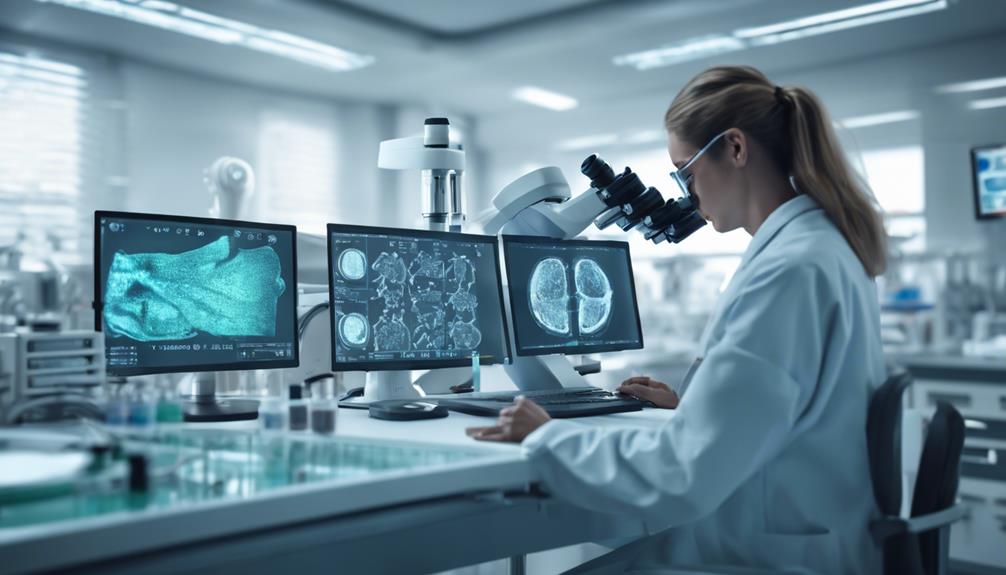
Medical technologists significantly influence patient outcomes by ensuring accurate and timely diagnostic results. You may not see them often, but their role is crucial in your healthcare journey. By accurately analyzing blood, tissue, and other samples, they provide the critical data that your doctors rely on to make informed treatment decisions.
Imagine you're feeling unwell and can't figure out why. It's the medical technologist's expertise that often leads to discovering underlying issues, whether it's a bacterial infection or a chronic disease like diabetes. Their findings directly impact the course of your treatment, shaping decisions on medication, therapy, and patient care management.
Moreover, they're also at the frontline of preventing disease spread. By identifying pathogens and understanding their behavior, medical technologists contribute to broader public health strategies that keep you and your community safe.
Their work doesn't just end at diagnosis. They monitor your health progress and response to treatment, providing ongoing data that ensures your treatment plan remains effective. You rely on their precision and dedication every step of the way, often without realizing it, as they work behind the scenes to ensure your health and safety.
Frequently Asked Questions
How Has the Role of Medical Technologists Evolved Over the Last Decade?
You've seen significant changes in the last decade, with more emphasis on digital technology, automation in testing, and a greater role in research and personalized medicine. It's a constantly evolving field.
Are There International Opportunities for Medical Technologists?
Yes, you'll find numerous international opportunities as a medical technologist. Many countries seek skilled professionals in this field, offering you a chance to work globally and experience diverse healthcare systems and technologies.
What Are Common Misconceptions About Medical Technologists?
You might think they just run tests, but medical technologists do much more. They analyze complex data, ensure accuracy, and play a crucial role in diagnosing and managing patient care.
How Do Medical Technologists Maintain Work-Life Balance?
To maintain work-life balance, you'll need to set clear boundaries, prioritize your health, and manage your time effectively. Using scheduled breaks and planning personal time can also significantly help in achieving balance.
What Is the Average Career Span for a Medical Technologist?
You're likely wondering about longevity in careers. For a medical technologist, the average career span can range from 30 to 40 years, depending on factors like workplace environment and personal health.
Conclusion
As a medical technologist, you play a crucial role in patient care, using specialized tools and technologies to analyze samples and deliver accurate results. Your extensive education prepares you for the diverse tasks you'll handle daily, from routine testing to complex procedures.
Despite the challenges, your expertise in various specializations profoundly impacts healthcare outcomes. Remember, your skills and dedication are vital in diagnosing and treating patients, ensuring they receive the best care possible.






